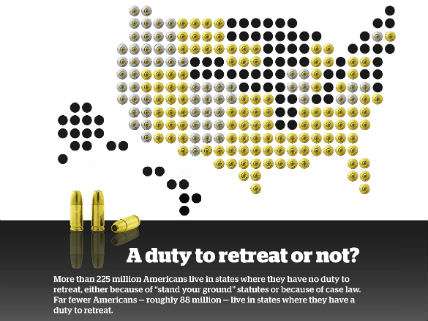'Stand Your Ground' Is Neither New nor Unusual

Tampa Bay Times reporter Peter Jamison offers a well-informed, clear-headed analysis of "stand your ground" laws that emphasizes three crucial points:
1. The essence of "stand your ground" is the absence of a duty to retreat for people attacked outside their homes. Contrary to what New York Times editorialists and other clueless critics claim, "stand your ground" does not mean a person is justified in using lethal force when he "reasonably believes" it is necessary to prevent death or serious injury. As Jamison notes, "the idea that 'reasonable belief' in a threat justifies homicide prevails throughout the country." Furthermore, "it is not, as some observers have claimed, carte blanche for killers to act on ungrounded fears, but a test of what an ordinary, rational person would do in the same circumstances."
2. "Stand your ground" is not new. While "22 states…have enacted 'stand your ground'-type statutes in the past two decades," Jamison writes, "an additional nine have established through case law that there is no duty to retreat." The California Supreme Court, for example, "empowered its citizens to stand their ground and use deadly force in public places about 120 years ago."
3. "Stand your ground" is the rule, not the exception. "More than 225 million Americans live in states where they have no duty to retreat, either because of 'stand your ground' statutes or because of case law," notes an infographic accompanying Jamison's article. "Far fewer Americans—roughly 88 million—live in states where they have a duty to retreat."
In other words, there is no basis to the notion that Florida is a crazy outlier when it comes to the circumstances in which people attacked in public places are permitted to use deadly force. Jamison does note two aspects of Florida's self-defense law that are unusual, but they have nothing to do with "stand your ground" per se: The law prohibits the arrest of someone who claims to have killed in self-defense unless there is probable cause to doubt that claim, and it gives such a defendant the right to a pretrial hearing where he can try to persuade a judge by a preponderance of the evidence that the homicide was justified.
I wish that Jamison, who mentions the George Zimmerman and Michael Dunn cases, had noted the dearth of evidence that the absence of a duty to retreat played a role in the outcomes of their trials. It did not figure in their defenses, and it is hard to see how it could have swayed jurors' positions, assuming they understood the law. (Jamison's colleague Kris Hundley made just that point about the Zimmerman case a couple of days after his acquittal.) Jamison does note that Zimmerman's jury would have received essentially the same instructions if he had been tried in Illinois, which has been a "stand your ground" state for a lot longer than Florida has.
Another point it would have been worth exploring: Even in states that impose a duty to retreat, it may be qualified so much that in practice it is little different from "stand your ground." In New York, for example, the victim of a public assault is expected to retreat rather than use lethal force only if he "knows" he can do so "with complete personal safety" for himself and others. Furthermore, there is an exception for someone who "reasonably believes that [the] other person is committing or attempting to commit a kidnapping, forcible rape, forcible criminal sexual act or robbery."
Toward the end of his article, Jamison speculates that maybe the real problem with Florida is its nondiscretionary carry permit law, or perhaps the combination of that law with the absence of a duty to retreat. That is a can of worms he should not have opened so casually. The issue surely deserves a more careful examination than Jamison's reference to an analysis by the Guardian that found "a statistical correlation with an increase in justifiable homicides" in "states with both SYG laws and the weakest gun controls." That gloss raises obvious questions about cherry-picking, conflating correlation with causation, and assuming that an increase in homicides deemed to be justified, which you would expect to see even if the laws were working exactly as intended, is necessarily a bad thing.
On the whole, however, Jamison's piece is a welcome corrective to the usual fact-free debate about "stand your ground" laws. It is especially striking coming from the Tampa Bay Times (formerly the St. Petersburg Times), which has been none too keen on Florida's law.


Show Comments (23)